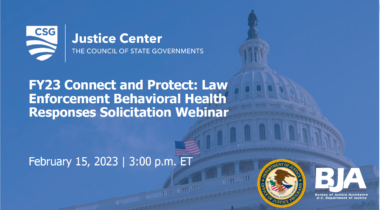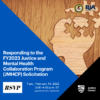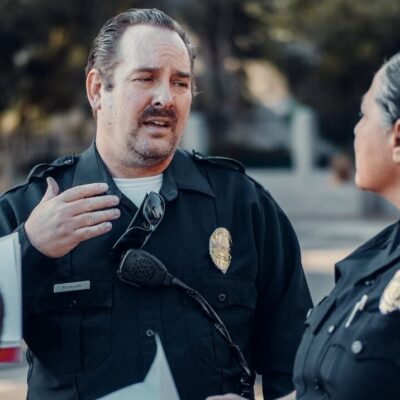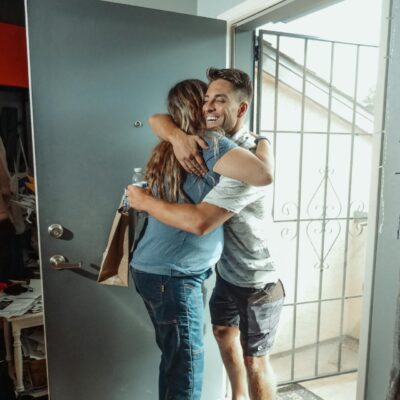Responding to the FY2023 Connect and Protect: Law Enforcement Behavioral Health Responses Solicitation
Hosted by The Council of State Governments (CSG) Justice Center and the U.S. Department of Justice’s Office of Justice Programs’ Bureau of Justice Assistance (BJA)
In this webinar, representatives from the U.S. Department of Justice’s Office of Justice Programs’ Bureau of Justice Assistance (BJA) and The Council of State Governments (CSG) Justice Center will review the FY23 Connect and Protect: Law Enforcement Behavioral Health Responses Solicitation application process. This grant program will provide an anticipated 27 awards in the amount of $550,000 each to city or township governments, county governments, federally recognized Native American Tribal governments, state-controlled institutions of higher education, state governments, and mental health agencies for a 36-month project. The program supports law enforcement-behavioral health cross-system collaboration that targets preliminarily qualified people who have come into contact with the criminal justice system and promotes public safety and public health to improve responses and outcomes for people with mental health conditions and co-occurring mental health and substance use disorders (MHSUDs).
Speakers:
- Maria Fryer, Program Analyst (Policy Advisor), BJA
- Nikisha Love, State Policy Advisor for JMHCP, BJA
- Tammy Lovill, State Policy Advisor for Substance Abuse and Mental Health, BJA
- Ernest Stevens, Deputy Division Director, Behavioral Health, CSG Justice Center
- Allison Upton, Deputy Program Director, Behavioral Health, CSG Justice Center
Successful Grant Application Examples
If you are interested in applying to receive Connect and Protect funding, the following programs can serve as guidance for successful applications and descriptions.
FY2021 Connect & Protect Awardee: City of Boston, Massachusetts
The Boston Police Department (BPD), in partnership with Boston Medical Center’s Boston Emergency Services Team (BEST), are seeking Connect and Protect funds to enhance its behavioral health response efforts. They will use these funds to: (1) hire a full-time master’s-level BEST clinician to serve as the Section 12 coordinator within the Street Outreach Unit; (2) embark on a culturally sensitive educational campaign to inform Boston residents about enhancements to the BPD’s mental health response efforts, including the Section 12 program; and (3) work with an academic partner to evaluate the program’s effectiveness. The City of Boston received the following JMHCP awards: FY2010, FY2013, FY2016, and FY2019.
FY2021 Connect & Protect Awardee: City of Tucson, Arizona
The Community Assessment Response and Engagement (CARE) project is a coordinated effort of the Tucson Police Department (TPD) and Connections Health Solutions to launch a law enforcement/mental health co-responder model. The CARE team will consist of a bachelor’s level clinician who will serve as the program manager and two case navigators/peers. The CARE team will respond to real-time crisis events, provide community stabilization, conduct follow-up/wrap around case management (e.g., assist with skill building, transportation to primary care and other health appointments, securing ID for patients, and connecting patients to same-day housing placement), address complex medical issues, and train law enforcement personnel across Pima County in de-escalation techniques, crisis intervention, and trauma informed care. This team will prioritize individuals at risk of harm with mental illnesses or co-occurring mental illness and substance use disorders, women with mental illnesses or co-occurring substance use disorders, and individuals with a moderate to high risk of recidivism.
The CARE team will act as a force multiplier for the well-established Mental Health Support Team and will serve 500 adults and juveniles per year. To develop the CARE team, a multi-agency planning committee that includes law enforcement, community treatment providers, prosecutors, and public defenders will be created. The task force will develop policies and procedures for the CARE team, identify and deliver pertinent trainings for the team (e.g., trauma-informed care and motivational interviewing), craft the necessary data sharing agreements, ensure quality data collection protocols are in place, create a mission statement, and hire the new CARE team staff members during the planning phase of the grant. During implementation, the CARE team will respond to calls and collect data, which the project partners will use to evaluate the program’s impact on behavioral health disparities related to access, engagement, and retention in Medication-Assisted Treatment; health-related treatment and services; substance use and mental health outcomes; and law enforcement encounters.
FY2021 Connect & Protect Awardee: Colorado Department of Public Safety
The Colorado Department of Public Safety will be building on the work done for its 2019 planning grant to better connect individuals who call 911 because of a behavioral health crisis to the care they need. The Colorado Department of Public Safety’s Division of Criminal Justice will partner with the Colorado 911 Resource Center, Colorado Office of Behavioral Health, Rocky Mountain Crisis Partners, Colorado Office of Suicide Prevention, and a number of other partners to accomplish the grant goals. The goals identified for the grantee team are: (1) create an interactive web-based planning and decision-making tool for region-specific specialized responses; (2) develop a specialized response program registry and interactive map; (3) develop and provide several e-Learning courses for emergency responders; and (4) designate Colorado state Police Mental Health Collaboration peer learning sites modeled after the national Law Enforcement-Mental Health Learning Site program. Beyond these goals, the project partners will: (1) explore the possibility of a voluntary registry for individuals who want their disability information available to emergency responders when dispatching specialized response units, and (2) developing a model peer specialist pilot program that will focus on post-crisis engagement and navigation of supportive services to decrease the occurrence of repeat crisis interventions. A portion of the grant will be subcontracted to a yet-to-be determined agency to pilot the peer specialist navigation program. The model developed during the planning phase will determine the number of individuals that will be served. The Colorado Department of Public Safety received the following JMHCP awards: FY2019.
FY2021 Connect & Protect Awardee: Region XII Commission on Mental Health, Mississippi
The Pine Belt Co-Responder Program (CoRP) in Mississippi is a collaborative effort between local Crisis Intervention Team (CIT)-trained law enforcement officers and Pine Belt Mental Healthcare Resources’ (PBMHR) Mobile Crisis Response Team to respond to and follow up on behavioral health crisis calls in southern Mississippi. The goals of this collaboration are reducing reliance on jails and emergency rooms and improving treatment engagement for people with mental illness and co-occurring mental illness and substance use disorders. The Pine Belt CoRP team is seeking to expand the co-responder team to the Hattiesburg, MS area, which includes Forrest and Lamar counties. PBMHR will hire a mental health clinician and community support specialist for the mobile crisis response team. They will also continue to train and certify CIT officers and seek to expand and adapt this training to include dispatch and correctional officers.
The Pine Belt Crisis Intervention Team (PBCIT) will be expanded and enhanced to provide two law enforcement CIT certification classes per year, and PBMHR will give officers the option to join the mobile crisis co-responder team in person or via telecommunication. The Daily Living Activities (DLA) functional assessment will be administered to program participants to measure their baseline functioning and assist with case planning; it will be re-administered every six months. The program evaluator will provide project officers with systems and client-level data to assist with program monitoring and related decision-making processes. Region XII Commission on Mental Health, Mississippi or Pine Belt Mental Health received the following JMHCP awards: FY2015 and FY2018.
Find other events
You might also be interested in
The sharp rise in school shootings over the past 25 years has led school officials across the U.S.…
Read MoreA three-digit crisis line, 988, launched two years ago to supplement—not necessarily replace—911. Calling 988 simplifies access to…
Read More





















